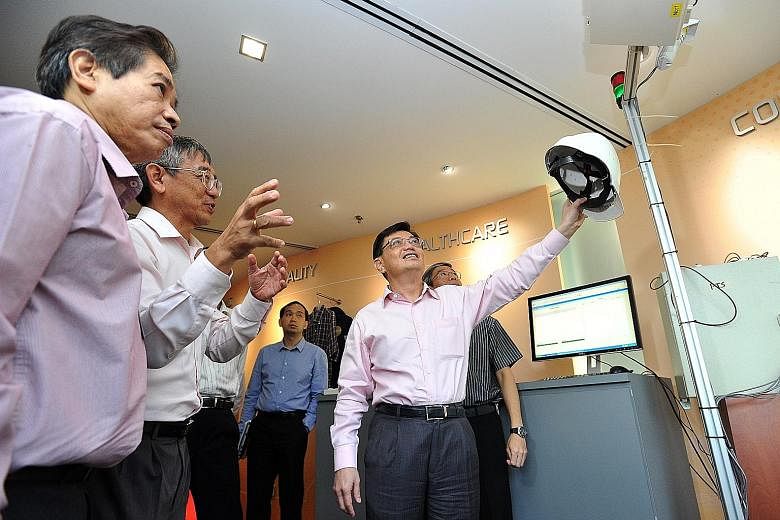Research institutes will play a key role in helping firms embrace innovation under the Industry Transformation Programme proposed in last month's Budget, said Finance Minister Heng Swee Keat yesterday.
Mr Heng noted: "We have every intention to ensure that our manufacturing sector remains competitive and that we move up the technology curve.
"Because we have a strong research base, because our companies have built that capability, I believe that if we can organise our efforts better, we will make a very important impact."
The minister was speaking after leading representatives from various economic agencies on a tour of the Singapore Institute of Manufacturing Technology (SIMTech) in Nanyang Drive.
Mr Heng, who said that "SIMTech will play a very important role in the Industry Transformation Programme", noted that Singapore must develop more "platform technologies" - those that can be used across various applications, and scaled across different companies.
RFID, or radio-frequency identification, is one such example. RFID tags are smart barcodes that make it easier to track the flow of goods or people. Now a ubiquitous technology used everywhere from supermarkets to hospitals, RFID was relatively unknown when SIMTech, which operates as part of the Agency for Science, Technology and Research (A*Star), started building its capabilities in the area 10 years ago.
When Downtown Line 2 of the MRT was being constructed five years ago, SIMTech worked with the Land Transport Authority to develop an RFID system to track worker access at the sites, eliminating the need for an attendant.
Each gantry comprising one RFID reader and two RFID antennae costs around $1,500, and the tags that go on the workers' helmets are 20 cents apiece, research engineer Tan Chak Huah told Mr Heng, adding: "Now, they should be cheaper."
Many small and medium-sized enterprises have also scaled up or developed new business lines with SIMTech's help.
O.E. Manufacturing, for example, makes hydraulic cylinders for oil rigs that are exposed to corrosive seawater.
Managing director James Wong worked with SIMTech to develop a proprietary ceramic powder that can be sprayed and bonded to steel to give the cylinders a strong coating so they are "almost built for life".
Mr Wong said: "Since I can't afford a big business lab, this partnership is appropriate."
At the end of his visit, Mr Heng told the media that firms must not hold back from investing in innovation. "Speaking to some of the companies, they all had some apprehensions earlier on. But once they started on this journey, they became willing to do even more. And this is the virtuous cycle that we have to get ourselves on."
SIMTech has a strength of 425 staff. About 89 per cent are research engineers and scientists, and 10 per cent are in industry development.
Last year, SIMTech collaborated with more than 690 firms across various industries.


